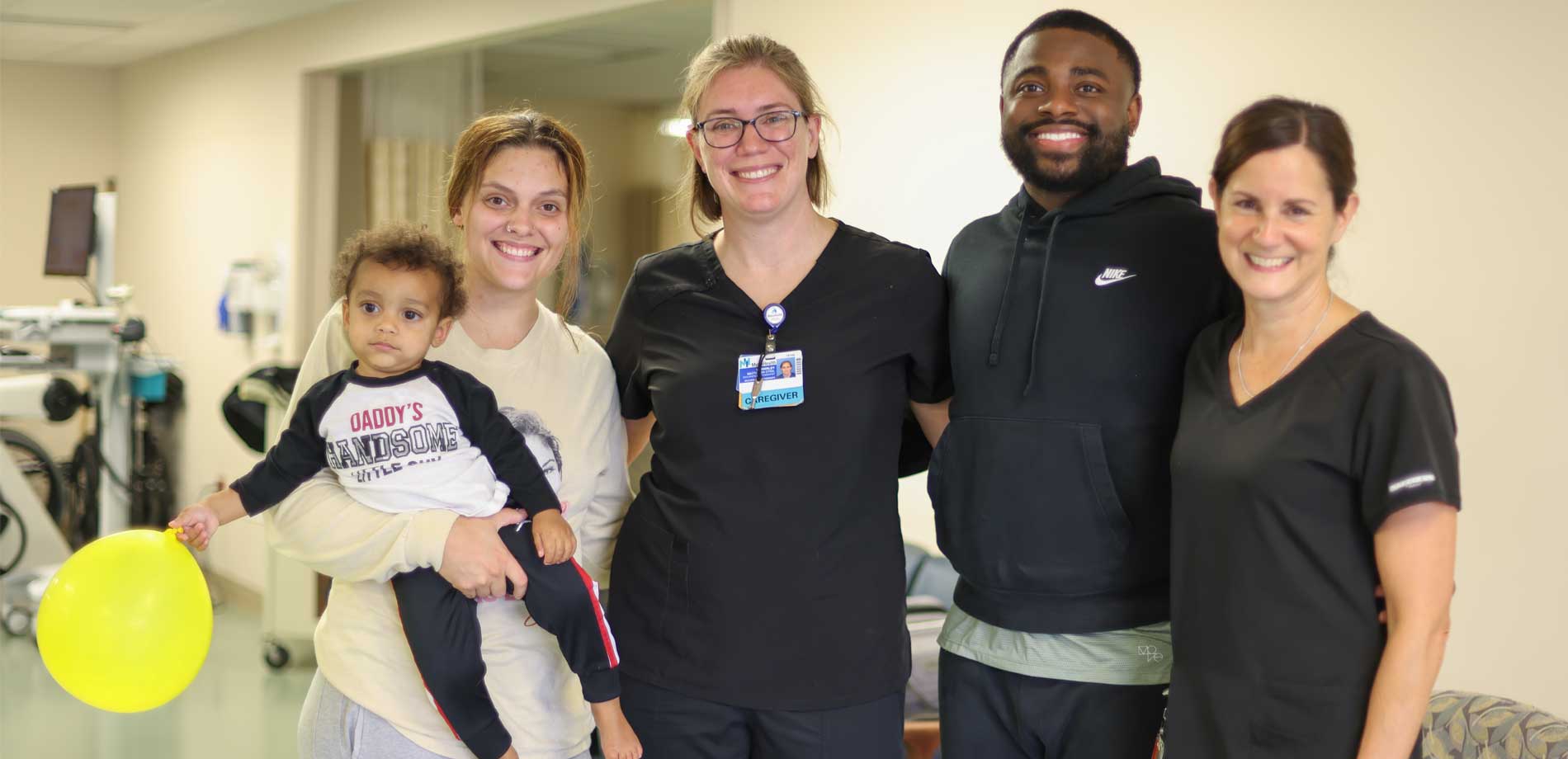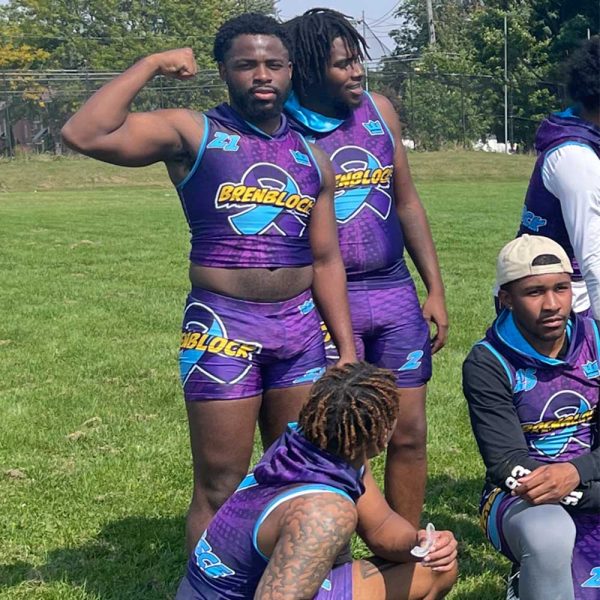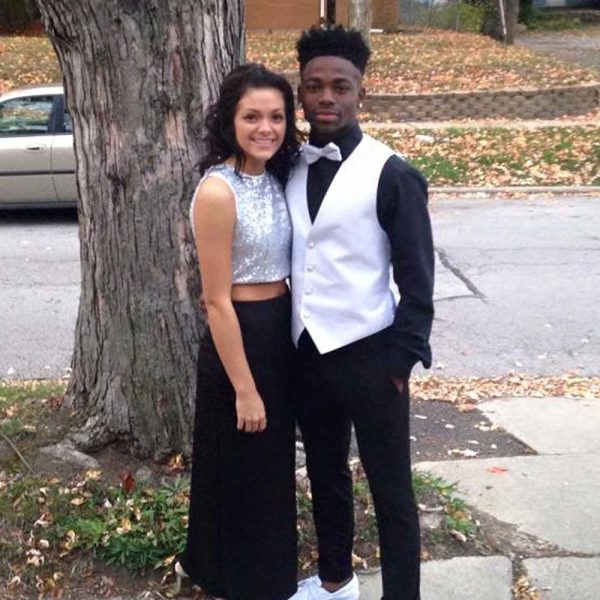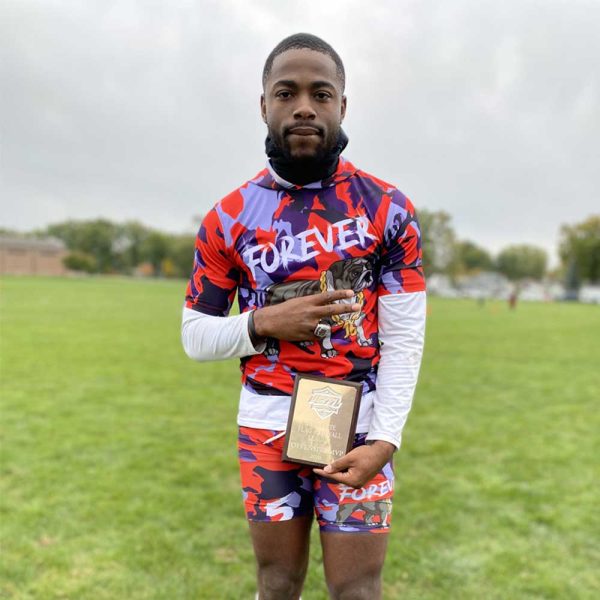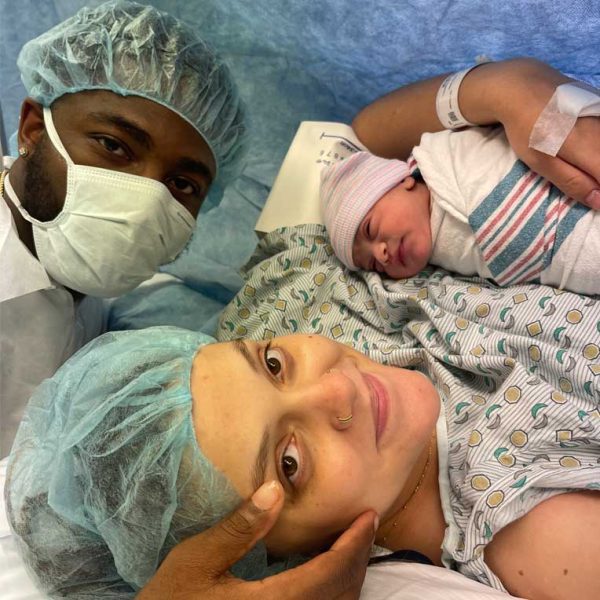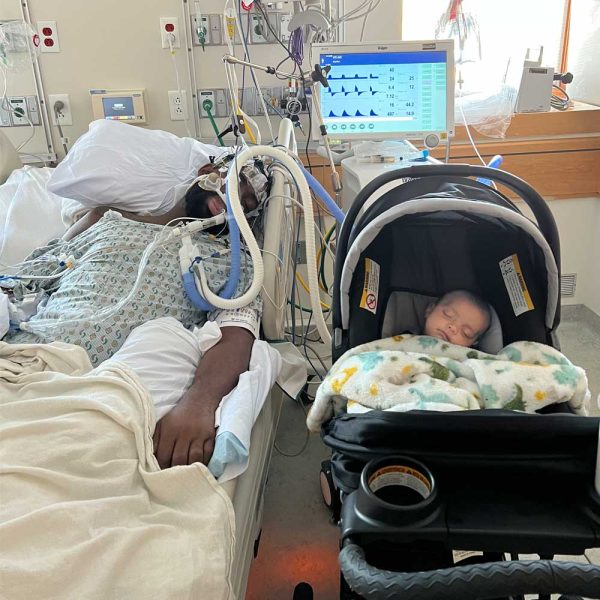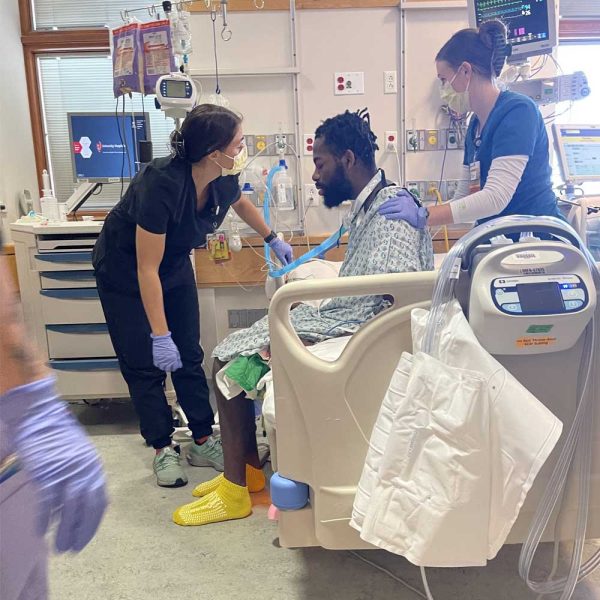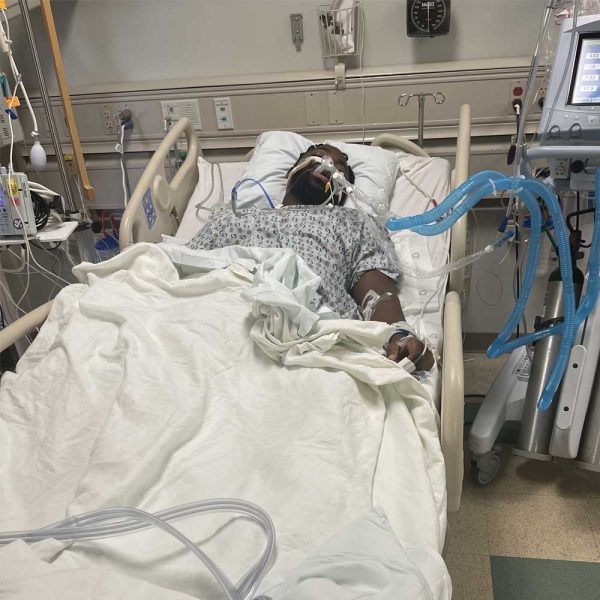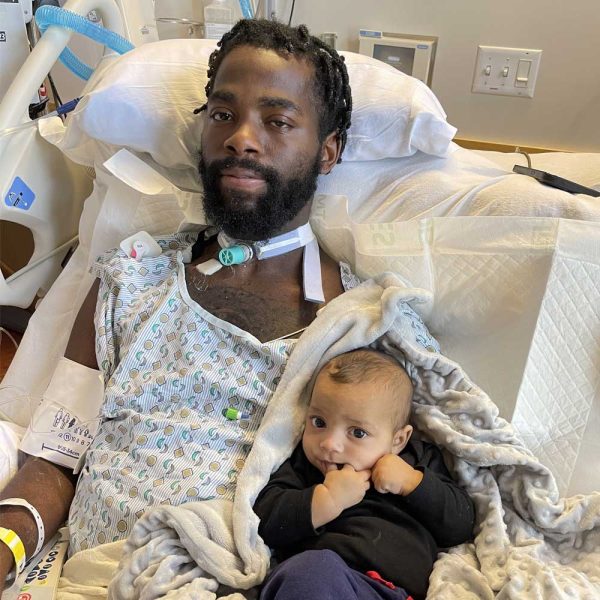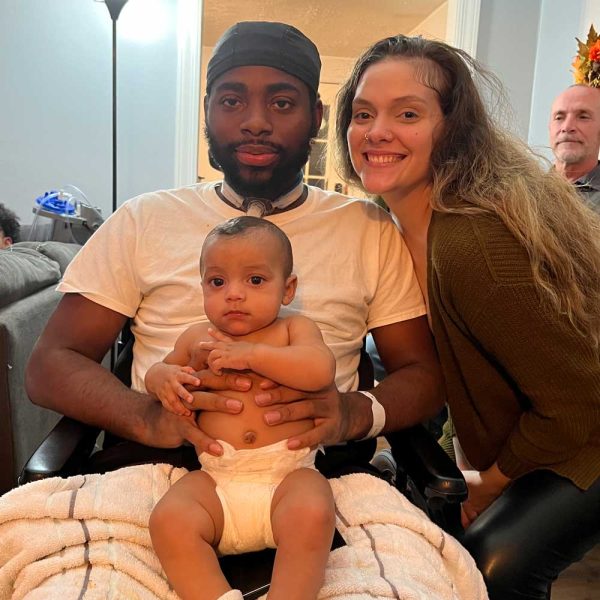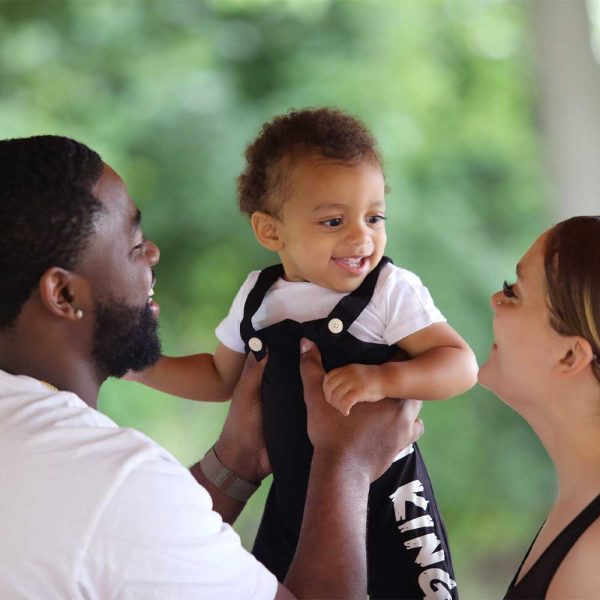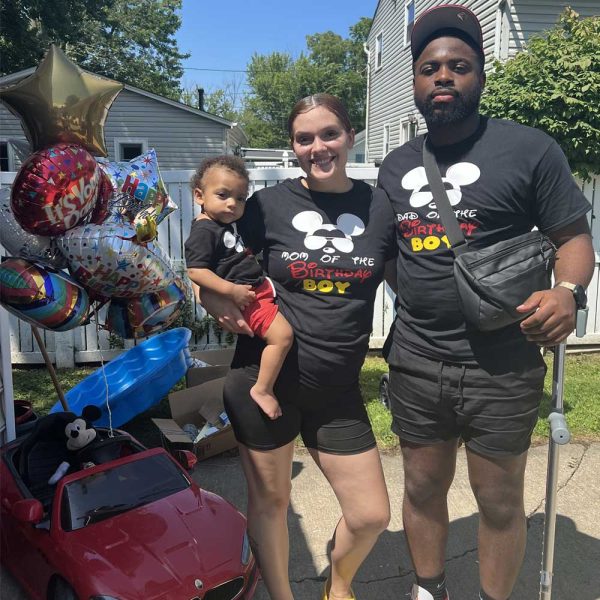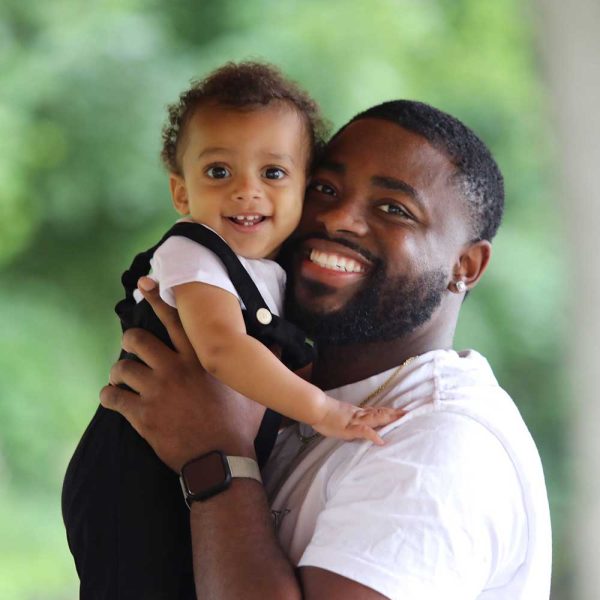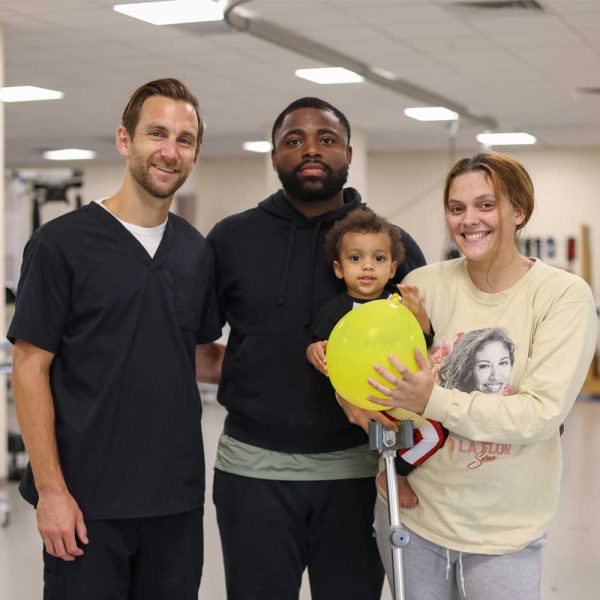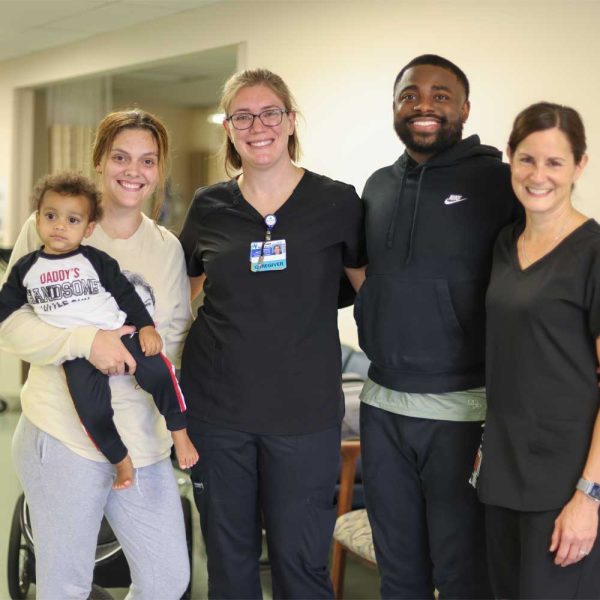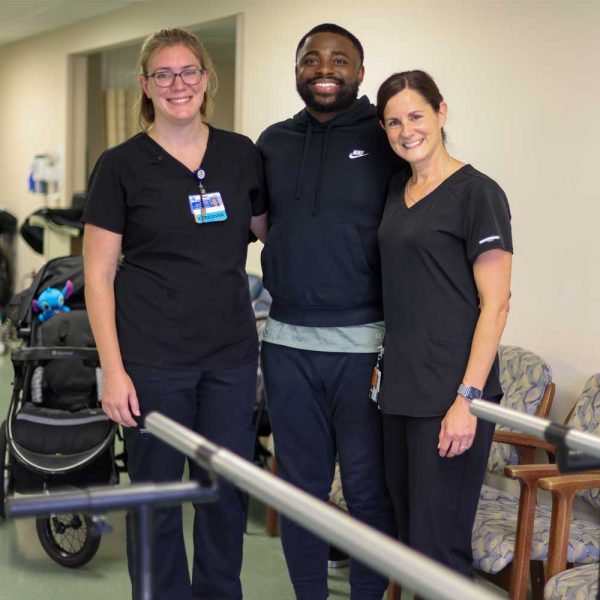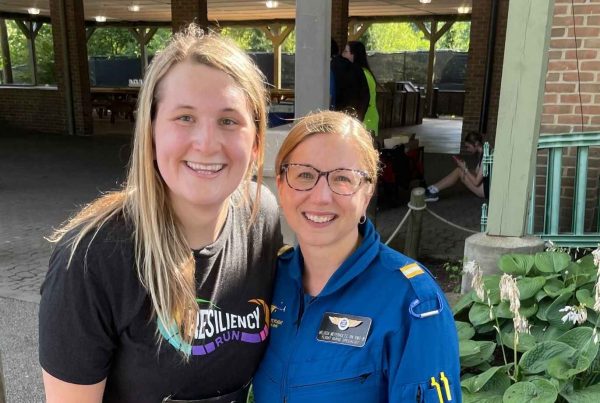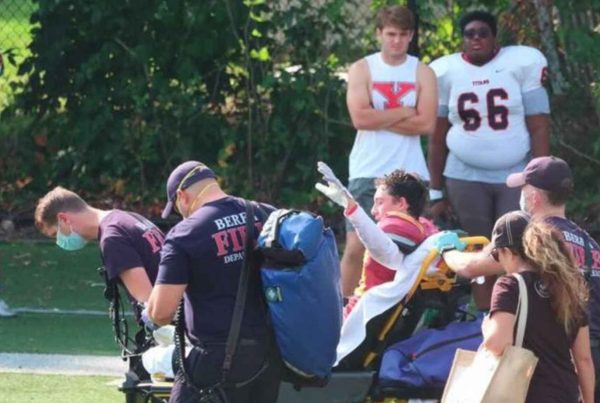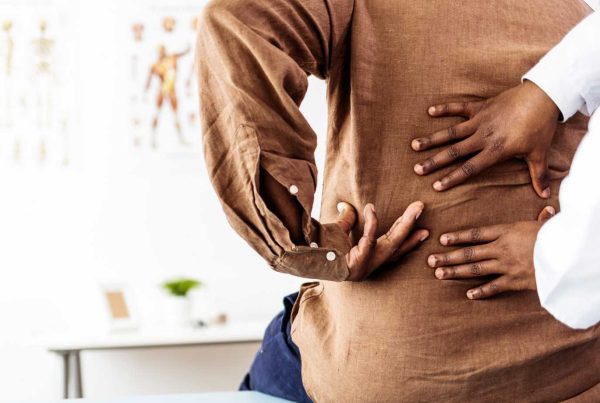Diagnosed with a rare autoimmune condition and viral meningitis, Jai-Quan had a long journey to reclaim the active lifestyle he once enjoyed – something made possible with the support of the compassionate caregivers at the MetroHealth Rehabilitation Institute.
“They gave me the drive to keep going.”
Jai’Quan Turner was thriving. The 23-year-old former football standout from Elyria High School, from which he graduated in 2017, had returned to his hometown after brief stints playing for colleges in Illinois and Iowa. He had reconnected with his high school girlfriend. In the 12 months he had been with T-Mobile, Jai’Quan had gone from being a customer service representative to assistant manager to managing his own store. When he wasn’t working 10-hour shifts, Jai’Quan was busy. Playing in a flag football league, lifting weights at the gym, and relaxing with yard work. And, since July 2022 when he and his girlfriend Zoe welcomed their son JJ into the world in July 2022, being a doting father.
In September 2022, right after a flag football game, Jai’Quan got a bad headache. He powered through, first thinking it was his allergies flaring up. When the pain didn’t go away, he wondered if he had the flu. A COVID-19 test came back negative. No medication seemed to work. He stayed home from work for a week, barely getting out of bed.
The headache continued getting worse. It was so bad that it hurt for Jai’Quan to even open his eyes, he had become extremely sensitive to light. After a bit of prodding from Zoe, Jai’Quan agreed that he should get checked out. On September 24 he went to a hospital 15 minutes from his home. Tests ruled out the flu and COVID-19. He went home with prescription strength Ibuprofen for the pain.
For a few hours, Jai’Quan felt good enough to do some things around the house, but by morning, the headache was so bad that he couldn’t function at all. Zoe took Jai’Quan to the emergency department of a hospital in Westlake. During a break from undergoing tests to see what was wrong, Jai’Quan’s legs gave out and he collapsed in the bathroom. He was admitted right away to the hospital.
A few days after being admitted to the hospital, Jai’Quan suffered a seizure. He had swelling in the brain. Doctors placed him in a medically induced coma before he was transferred to University Hospitals Cleveland Medical Center. Doctors kept him in the coma for about a month, until the swelling went down. Once Jai’Quan was fully awake, he heard for the first time that he had GFAP astrocytopathy – a rare autoimmune condition that affects the central nervous system – and viral meningitis, the inflammation of the protective covering of the brain and spinal cord.
One of Jai’Quan’s first memories of emerging from the coma was of trying to move his arms and legs while being given a bath. “I wasn’t able to move anything,” he says. “All I could do was look around. The only thing I could move were my eyeballs.”
Jai’Quan was moved out of the ICU. He could turn his head and look around slowly at visitors, but he could barely lift his arms off the bed. A newly inserted tracheostomy tube to help air and oxygen get into his lungs meant he could only mouth words. He had a feeding tube.
Doctors started discussing the next steps with Jai’Quan. In addition to being treated with a powerful course of steroids, he would need to have extensive rehabilitation to regain movement and function in his body.
“They went into depth about how long I’d probably be in rehab and what I would be doing,” he said. He faced months of recovery.
The doctors’ first choice was to transfer Jai’Quan to the MetroHealth Rehabilitation Institute. Jai’Quan never heard what the second choice was because on November 4 he got word that MetroHealth had approved his insurance and had a bed waiting for him.
“They said that MetroHealth was highly rated out of all the rehabs and that was the destination they wanted me to be at,” he says.
Other than the fact that it was in Cleveland, Jai’Quan didn’t know anything else about the health care system. He had never received care there, and until a few weeks before, he’d never had to stay overnight in any hospital.
After more than five weeks in the hospital, Jai’Quan went to the MetroHealth Rehabilitation Institute in early November 2022. Almost immediately, his inpatient therapists noticed his motivation and positivity.
Physical therapist Ann Hardebeck saw how extreme arm weakness kept Jai’Quan from self-propelling himself in his wheelchair. But he soon went from 2 lb. weights to using the rowing machine with ease.
Shortly after Thanksgiving, aides rushed into Jai’Quan’s room after he fell trying to transfer from his wheelchair into bed by himself. Unhurt, he was in bed talking on the phone later when he successfully wiggled his feet. Ann decided to increase the intensity of his sessions and started “waking up” his quadricep muscles by delivering electrical stimulation through electrodes placed on his thighs.
“We recognized he had more strength in his trunk and hip muscle,” she says.
Occupational therapist Kimberley Matteson recalls Jai’Quan’s pride in putting pants on by himself for the first time. Making light of his earlier appearance, when he couldn’t brush his hair or shave, he told her, “I was a mess. And you didn’t tell me!”
Speech therapist Megan Chapin led Jai’Quan in respiratory muscle strength training to counteract the effects of six weeks with a trach tube.
They also focused on improving his moderate cognitive communication impairment – memory, problem-solving, and learning new things – that had developed during his coma. Not being able to remember specific details surrounding his son’s birth crushed him.
“I could see him working hard to figure things out,” Megan says. “It took weeks of work.”
By early December, Jai’Quan could stand up using a pair of Knee Ankle Foot Orthoses leg braces. He was more adept with his wheelchair. His reading and writing improved.
Jai’Quan’s main goals were to be able to play with JJ on the floor, get back up on his own, and walk. “I started taking a few steps with a lot of assistance from Ann just to see how it felt,” he says.
He saw other patients walking. His determination grew.
Jai’Quan arrived at outpatient rehab on December 13, 2022.
“He was so impaired,” says occupational therapist Mary Harley. “He had difficulty sitting up on the mat without the support of his hands to hold himself up.”
Two weeks later, Jai’Quan began working with physical therapist Nick Pederzolli.
In mid-January, Jai’Quan returned to work at T-Mobile as a part-time assistant manager. The hardest part of being back at work was having to look up at people from his wheelchair and answer customers’ questions about his condition.
Tired of explaining what happened, Jai’Quan would say he’d been in a car accident.
But for those who seemed genuinely interested, Jai’Quan would reveal more. “It did help to talk about it with strangers,” he said. “Some would pray with me and pray over me.”
Mary helped Jai’Quan condition his core muscles and upper body – lifting heavier free weights, and standing for longer periods of time – so he could improve his strength and energy. Building up his endurance was critical to improving his chances of walking again.
Nick put Jai’Quan through leg workouts and wheelchair skills. With his customized KAFO (Knee Ankle Foot Orthoses) braces, Jai’Quan began standing at the parallel bars. Progress seemed to stall after a couple of months. But then, he started walking at the parallel bars.
“When I took my first step with the KAFOs, it gave me more of a confidence boost. I was able to kick it up a notch,” he says. “Once I was approved to stand up on my own, it gave me more energy and power to go and walk and do things while I wasn’t at physical therapy.”
Jai’Quan’s last session with Mary was in March. Working with Nick, he soon started using a walker. He switched from KAFOs to an Ankle Foot Orthoses (AFO) brace.
“I was hopeful, but I wasn’t certain, that he was going to be able to use the walker without those braces,” Nick said. In May, that’s exactly what happened.
“To be honest, there was never a time when I was in doubt that I would walk again,” Jai’Quan said.
That month, he had a small 24th birthday celebration with friends and family. And, for the first time in eight months, he drove a car by himself.
By June, Jai’Quan had replaced his rollator with a Lofstrand crutch. It was a huge adjustment. “I had to rely just on my legs for the first time. I was off balance. It was hard to get the rhythm down, but one day it just clicked.”
One day Jai’Quan showed up for a session with physical therapist Nick Pederzolli not wearing the Ankle Foot Orthoses (AFO) braces.
He still uses his crutch. But the lingering effects of his condition have all but disappeared.
On July 21, Jai’Quan and Zoe celebrated JJ’s first birthday. They hosted around 40 people – family and friends – at their home.
Today, Jai’Quan is back at work full-time.
Zoe, who stopped working while Jai’Quan was hospitalized, went back to school in January. In September, she started a new position as a medical assistant.
On October 9, Jai’Quan finished physical therapy. Instead of workouts with Nick that included running and jumping with bodyweight support systems, and working on his balance, Jai’Quan works out at a gym near his home.
“He’s had a phenomenal recovery from transverse myelitis,” says Nick, referring to spinal cord inflammation that impacted so much of Jai’Quan’s movement. He’s part of the estimated one-third of people who make a full or near-full recovery.
And he’s conquered one of his biggest goals: being able to be an active dad. Months earlier he promised himself that he’d once again play with JJ on the floor and get back up again on his own. He succeeded. One of their favorite things is playing basketball – Jai’Quan tossing the ball to JJ and watching him “shoot.”
Jai’Quan hopes to rejoin his flag football team as a player or coach. He also wants to get his barber’s license and find time to work with the Elyria High School football team.
“Delayed does not mean denied,” he says.
Jai’Quan gives big thanks to his inpatient and outpatient therapists. “They worked with what I could give them and took that – and me – to another level
“They studied me and recommended things tailored to me, and put me through some things to get me back on my feet.
“They gave me the drive to keep going.”
Metrohealth Rehabilitation Institute
Leaders in rehabilitation, research, and education to improve care for the most complex injuries and illnesses. Visit our website for more information about the MetroHealth Rehabilitation Institute or call:
- Outpatient appointments for adults and children, call 216-778-4414
- Inpatient services or admission for adults and children 13 yrs+, call 216-778-4167
Do you want to help patients like Jai’Quan? The MetroHealth Foundation is making a difference every day. Learn more or give at metrohealth.org/foundation.

